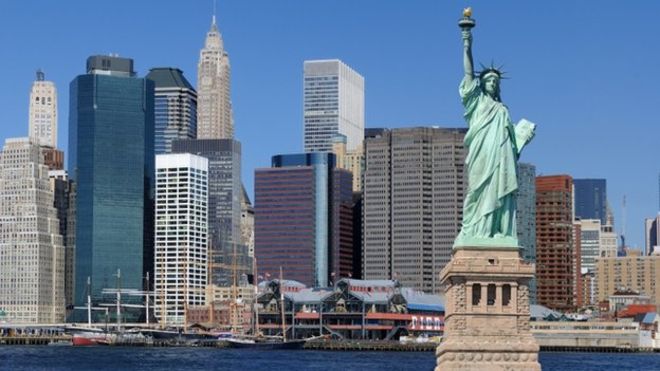America is unique among nations in a number of ways, some of which are good, and some of which are not. Racism is not unique to America, and America is, today, the least racist nation on Earth (as you can see by looking at the Map of Least Racist Nations from the Washington Post). We do, however, have a unique racist past, and that past continues to haunt our present. And yet we are still unique among nations in both why we were founded, and in what we stand for under our founding documents.
 Our country was founded on two simple principles: freedom, and liberty. These two words are very closely related, and in fact, the base definitions are the same. ‘Freedom’ is a Germanic word, and ‘liberty’ is Latin. In use, however, ‘freedom’ is generally used to refer governance of a people, and liberty is generally used to refer to individual freedom. We are free because we are self governing, with governance occurring at the most local level possible (‘federalism’), and we have liberty, because our federal Constitution limits the scope of the federal government to a very specific set of powers, leaving the states, and the people, free to live however they wish (provided that we allow others to do the same). There are other nations that to one degree or another practice the same principles we do, but there is no other nation that was founded upon them, and there is no other nation that practices them as closely as do we.
Our country was founded on two simple principles: freedom, and liberty. These two words are very closely related, and in fact, the base definitions are the same. ‘Freedom’ is a Germanic word, and ‘liberty’ is Latin. In use, however, ‘freedom’ is generally used to refer governance of a people, and liberty is generally used to refer to individual freedom. We are free because we are self governing, with governance occurring at the most local level possible (‘federalism’), and we have liberty, because our federal Constitution limits the scope of the federal government to a very specific set of powers, leaving the states, and the people, free to live however they wish (provided that we allow others to do the same). There are other nations that to one degree or another practice the same principles we do, but there is no other nation that was founded upon them, and there is no other nation that practices them as closely as do we.
And yet, we have largely let our founding ideals go, starting with the notion that if a state or local government reaches for too much power, people can easily move out from underneath it, and that as such, power should be applied as locally as possible, or in other words, federalism.
Those who want power don’t like federalism, as federalism allows people to move out from underneath their power. Power hungry people want power at the national (or even world) level, and that is why our federal government has grown so powerful.
Our fall from grace started in the early 20th century, when progressives on our Supreme Court began to talk about a ‘living Constitution’. Justice Thurgood Marshall expressed this view the best, when he said, “The <Supreme> Court must have the courage to creatively interpret the Constitution, to become the legislature of last resort, willing to do whatever the Congress either cannot do, or will not do.” As this view took hold, court precedent replaced the Constitution as the law of the land. Essentially, the Constitution today means whatever the nine people on the Supreme Court say it means, with no regard for the actual wording. And it is not just the Constitution that the courts can ‘creatively interpret.’ The courts can apply this to all law, making the laws our legislature writes mean whatever the courts want. In this view, the court becomes the legislature. We end up with but two branches of government: the court, to define the law, and the President, to enforce the court’s wishes. ‘We the People’ have no say.
We have also had originalist Supreme Court Justices, such as the late Antonin Scalia, who believe in strictly interpreting the Constitution, using definitions that were common at the time the Constitution was written. Unfortunately, even Antonin Scalia was hesitant to strike down powers that the Federal Government had already been wielding, and because of this, even with a majority originalist court, we can only seem to slow down the slow decay of our nation’s original ideals. That, frankly, is not good enough.
The greatest mistake our founders made was in failing to extend liberty to all people. Slavery should have been abolished by the Constitution, and Jim Crow should never have existed. Jim Crow in fact violated the 13th Amendment – it was only a ‘creative interpretation’ of the 13th Amendment, by racists on the court, that allowed Jim Crow, and if you read the 13th Amendment, and then the Civil Rights Act, you’ll see that they both say essentially the same things. Jim Crow only existed because of a ‘living Constitution.’
In spite of our imperfections, the basic ideals of freedom and liberty, extended to all people, is still exceptional, and the fact that we have less freedom and liberty today than we had in the past makes the fight for these ideals ever more important if America is to be exceptional.
We are a nation of exceptional ideals that is at war with itself. Large swaths of our public believe in identity groups, inherently trying to oppress each other. These ‘Social Justice Warriors’, as they are often called, view themselves as some kind of ‘moral and intellectual elite’, uniquely qualified to control the nation ‘fairly’. To these people, freedom and liberty cause oppression, and white men use their freedoms to oppress everyone else. To the Social Justice Warrior, our founding ideals cause oppression, and only by denying those ideals, or more to the point, by selectively allocating them based on the level of oppression different groups are subjected to, can ‘fairness’ be assured. To these people, our founding ideals are the antithesis of ‘exceptional’, and the United States is the most vile, evil, hateful nation in world history. There are Americans out there who believe that we are worse than the Nazis. Self-hatred, on a national level, has become the ‘in thing’ across our college campuses, and if you don’t believe that, see Cultural Marxism: A Primer.
I honestly don’t know if I can say that the United States is exceptional today, and on an absolute scale we never were. We have never achieved what, to me, would have been absolute exceptionalism – the application of maximum liberty to all people – and yet, that goal is still tantalizingly within our grasp. We need only follow the Constitution.
I, for one, believe that American Exceptionalism is worth fighting for, which is to say that I believe we need to take our founding ideals and extend them to all of our people. That means we need to reduce the size and scope of the federal government, returning the vast majority of power to the states, and we need to ensure that all laws pass constitutional muster under an originalist interpretation, including the laws currently on the books. We must stand up to Social Justice Warriors and tell them that justice either exists on an individual level, or it does not exist at all. We need to stand up to socialists, telling them that their utopia is not only impossible, but immoral, as it stands in the face of individualism and personal liberty. We need to stand up to those who wish to make our nation a true Democracy, telling them that though our government may be run through democratic processes, our government is supposed to be limited, and it is illegal and immoral to extend it beyond those limits.
Milton Friedman once said, “Democracy may be the best way to run a government, but government is the worst way to run a country.” Those who try to extend government over more of our lives claim to do so for the moral good, but this claim is false. We cannot let them claim the moral high ground while they seek to control others. We must call them out as the evil they are. Ours is the moral high ground, and we will never make this nation as exceptional as it was meant to be until we stand tall on that moral high ground and call out those who wish to tear our nation down.
We must also unite the libertarian factions to vote as a block. This includes the Libertarian Party, libertarians in the Republican Party, Constitutional Conservatives, and libertarians in the Democrat Party. These groups do not agree on everything, but if we can all agree that someone like Rand Paul is better than someone like Donald Trump or Hillary Clinton, and if we can all get behind someone like Rand Paul, even though he may not be ‘perfect’ as a libertarian, then we can begin to move the needle back toward a constitutional base.
Libertarianism fails not because it wants the wrong things, but because it wants the right things, right now, and is often not willing to compromise. As idealists, we are not always very good politicians, and we get outmaneuvered at every turn. We must stand for our ideals, of course, but we must also make inroads, and that means reaching out to other groups when and where we agree. It also means voting as a block, and backing people who can win. That, right now, is Rand Paul, and though we may disagree on who, specifically, should be the standard bearer, if we fail to unite behind someone, we all lose.
American Exceptionalism is not a thing, but a goal, and perhaps even a choice. We need to discuss it, because only through discussion can we reach our ideals to become the exceptional nation we have always been meant to be.



















